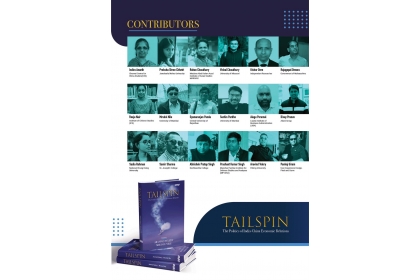PhD candidate from Graduate Institute of International Politics published the book with Indian scholars
2021-01-06
興新聞張貼者
Unit秘書室
2,059
Ms. Sadia Rahman, National Chung Hsing University’s Doctoral Candidate at the Graduate Institute of International Politics department has contributed a chapter titled ‘Does A Free Fall of India-China Relationship Offer Opportunities to Strengthen India-Taiwan Relations?’ in the book entitled Tailspin The Politics of India-China Economic Relations. The chapter develops the scholarship on India-China rivalry with China trying to change the status-quo at the Himalayan borders, and reinstituting its hegemony in Asia.
India-China bilateral relationship has hit a rough phase where China is taking the lead altering the status-quo thus, the chapter addresses China’s proposition of peaceful rise as shallow because of China's assertive diplomacy towards India, in the South China Sea, and towards Taiwan.
The chapter attempts to do a literary examination of the changing nature of the India-China relationship, explicitly reviewing China's salami-slicing strategy. Lastly, the chapter argues that India should not just Look East but also Act East by establishing a robust relationship with Taiwan as India faces no security threats from Taiwan.
The book entitled Tailspin The Politics of India-China Economic Relations is published at a significant time developing scholarship on understanding China when China is peaking its muscle and economic power. The book brings out several aspects of India’s political, economic relations with China. Apart from the convergences, divergences and paradoxes nuancedly discuss in the existing India-China bilateral relationship pieces of literature, this book scholarship covers a broader range of bilateral relationships of two major neighboring powers in Asia.
The unprecedented challenge in India-China bilateral relationship is not only about understanding the boundaries and boycott of Chinese products, but the crux of the frail understanding of the bilateral relationship lies in deficiency of trust knowledge and repository of experts on China. To deal with India’s China tailspin, effectively understanding and comprehending China is a necessity.
The book underlines the fact that while leveraging China’s inherent contradictions, India has to deleverage from China’s subtle global aspirational designs of domination. Besides rekindling the analysis on leadership, state capitalism and geo-economics, the book narrates exceptional cases such as the trade war, structural conflicts in the Chinese Political Economy, BCIM, WTO negotiations, maritime trade, BRI, and Taiwan to elaborate better the stakes involved in dealing with China. The recent boundary dispute between India and China created a tailspin setting off a raucous debate over China’s economic diplomacy and how India could comprehend it well.
India-China bilateral relationship has hit a rough phase where China is taking the lead altering the status-quo thus, the chapter addresses China’s proposition of peaceful rise as shallow because of China's assertive diplomacy towards India, in the South China Sea, and towards Taiwan.
The chapter attempts to do a literary examination of the changing nature of the India-China relationship, explicitly reviewing China's salami-slicing strategy. Lastly, the chapter argues that India should not just Look East but also Act East by establishing a robust relationship with Taiwan as India faces no security threats from Taiwan.
The book entitled Tailspin The Politics of India-China Economic Relations is published at a significant time developing scholarship on understanding China when China is peaking its muscle and economic power. The book brings out several aspects of India’s political, economic relations with China. Apart from the convergences, divergences and paradoxes nuancedly discuss in the existing India-China bilateral relationship pieces of literature, this book scholarship covers a broader range of bilateral relationships of two major neighboring powers in Asia.
The unprecedented challenge in India-China bilateral relationship is not only about understanding the boundaries and boycott of Chinese products, but the crux of the frail understanding of the bilateral relationship lies in deficiency of trust knowledge and repository of experts on China. To deal with India’s China tailspin, effectively understanding and comprehending China is a necessity.
The book underlines the fact that while leveraging China’s inherent contradictions, India has to deleverage from China’s subtle global aspirational designs of domination. Besides rekindling the analysis on leadership, state capitalism and geo-economics, the book narrates exceptional cases such as the trade war, structural conflicts in the Chinese Political Economy, BCIM, WTO negotiations, maritime trade, BRI, and Taiwan to elaborate better the stakes involved in dealing with China. The recent boundary dispute between India and China created a tailspin setting off a raucous debate over China’s economic diplomacy and how India could comprehend it well.



